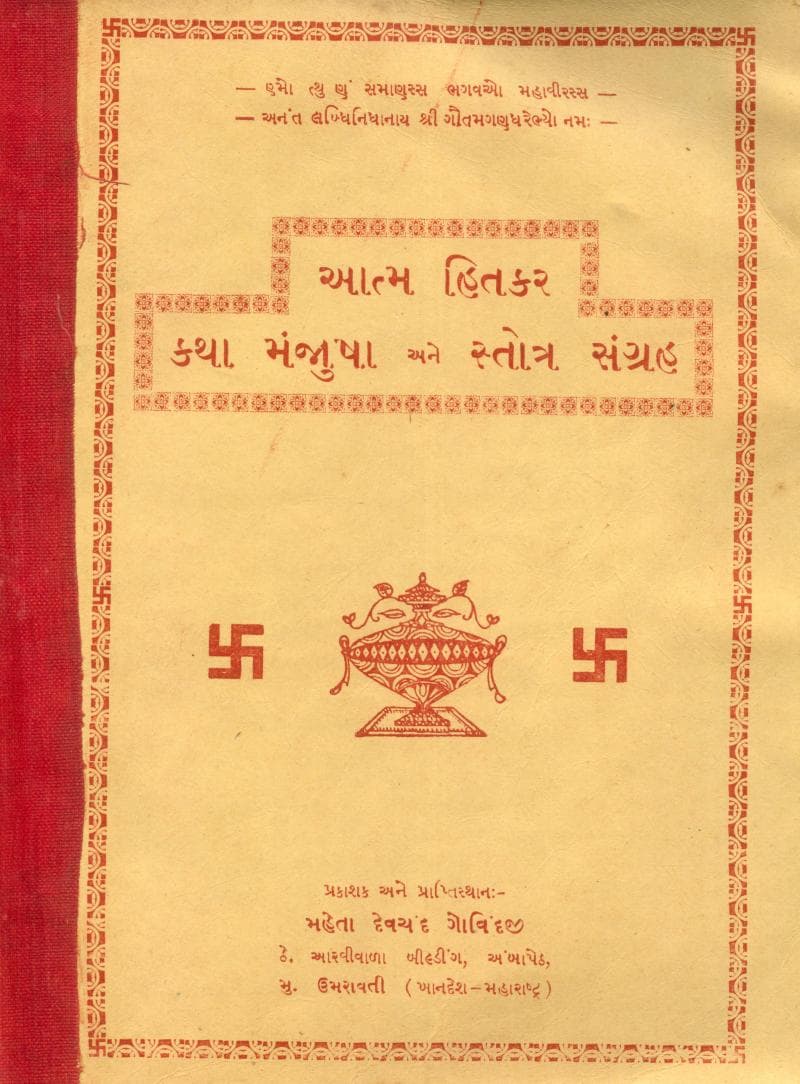Aatm Hitkar Katha Manjusha Ane Stotra Sangraha
Added to library: September 1, 2025

Summary
Here's a comprehensive summary of the Jain text "Aatm Hitkar Katha Manjusha ane Stotra Sangraha" by Mehta Devchand Govindji, based on the provided catalog link:
Aatm Hitkar Katha Manjusha ane Stotra Sangraha: A Treasury of Spiritual Guidance and Devotional Hymns
"Aatm Hitkar Katha Manjusha ane Stotra Sangraha" (आत्म हितकर कथा मंजूषा अने स्तोत्र संग्रह), authored by Mehta Devchand Govindji and published by Mehta Devchand Govindji, is a significant Jain text that serves as a valuable resource for spiritual seekers. The title itself, translating to "A Treasury of Self-Beneficial Stories and a Collection of Hymns," accurately reflects the dual purpose of this compilation: to provide edifying narratives that promote spiritual well-being and to offer devotional poetry for contemplation and praise.
Core Content and Purpose:
The book is structured into two primary sections, each fulfilling a distinct spiritual need within the Jain tradition:
-
Aatm Hitkar Katha Manjusha (आत्म हितकर कथा मंजूषा): This section comprises a collection of "Aatm Hitkar Kathas" (आत्म हितकर कथा), which can be understood as stories that are "beneficial for the soul" or "conducive to self-improvement." These narratives are not merely fictional tales but are deeply rooted in Jain philosophy and ethics. They likely recount:
- Lives of Great Souls: Stories of Tirthankaras, Siddhas, Acharyas, Upadhyayas, and Sadhus/Sadhvis who have achieved liberation (Moksha) through their virtuous deeds and spiritual practices. These stories serve as inspiring role models, demonstrating the path to spiritual heights.
- Ethical Teachings and Principles: Narratives illustrating the practical application of Jain ethical principles such as Ahimsa (non-violence), Satya (truthfulness), Asteya (non-stealing), Brahmacharya (celibacy/chastity), and Aparigraha (non-possession). These stories likely highlight the consequences of adhering to or deviating from these principles.
- Examples of Renunciation and Austerity: Accounts of individuals who have renounced worldly possessions and comforts in pursuit of spiritual liberation, showcasing the power of detachment and self-discipline.
- Illustrations of Karma and Rebirth: Stories that demonstrate the workings of the law of karma, explaining how actions in this life and previous lives influence one's destiny and future rebirths. This serves to reinforce the importance of righteous conduct.
- Moral Lessons and Wisdom: The overarching purpose of these stories is to impart moral lessons, cultivate compassion, foster detachment, and guide the reader towards a path of righteousness and spiritual upliftment. They are designed to be easily understood and internalized, promoting spiritual growth through engaging narratives.
-
Stotra Sangraha (स्तोत्र संग्रह): This section is a collection of "Stotras" (स्तोत्र), which are devotional hymns, prayers, and verses of praise dedicated to various revered figures and deities within the Jain tradition. These hymns are central to Jain devotional practice and likely include:
- Praise of Tirthankaras: Hymns extolling the virtues, accomplishments, and spiritual prowess of the 24 Tirthankaras, particularly Lord Rishabhdev (Adinath), Lord Mahavir, and others.
- Devotional Verses to Jain Deities: Prayers and praises directed towards celestial beings and Yakshas/Yakshinis who are often associated with Tirthankaras and play a role in spiritual guidance.
- Shorter Devotional Compositions: Likely includes various forms of devotional poetry, such as Mangalpath (auspicious chants), Aarti (songs of worship), and Chalisa (forty-verse hymns), designed for regular recitation and meditation.
- Cultivation of Bhakti (Devotion): The Stotra Sangraha aims to foster a deep sense of devotion, reverence, and surrender to the spiritual ideals of Jainism. Regular recitation and understanding of these hymns are believed to purify the mind, attract positive spiritual energy, and aid in the attainment of spiritual goals.
Author's Contribution:
Mehta Devchand Govindji, as the author and publisher, has undertaken the significant task of compiling and presenting these sacred texts. His contribution lies in preserving and disseminating these valuable spiritual teachings and devotional compositions, making them accessible to a wider audience for their personal spiritual benefit.
Overall Significance:
"Aatm Hitkar Katha Manjusha ane Stotra Sangraha" is more than just a book; it is a spiritual guide and a devotional companion for Jain practitioners. It provides a rich blend of:
- Didactic Content: Through the stories, it educates and guides individuals on the principles and practices of Jainism.
- Devotional Inspiration: Through the stotras, it inspires reverence, fosters a connection with the divine, and aids in the practice of devotional worship.
- Holistic Spiritual Development: By combining edifying narratives with devotional poetry, the book aims to nurture both the intellectual understanding and the emotional devotion of the reader, leading to a more comprehensive spiritual development.
In essence, this book serves as a "manjusha" (treasury), offering precious jewels of wisdom and devotion that can illuminate the path to self-realization and spiritual well-being for every Jain follower.